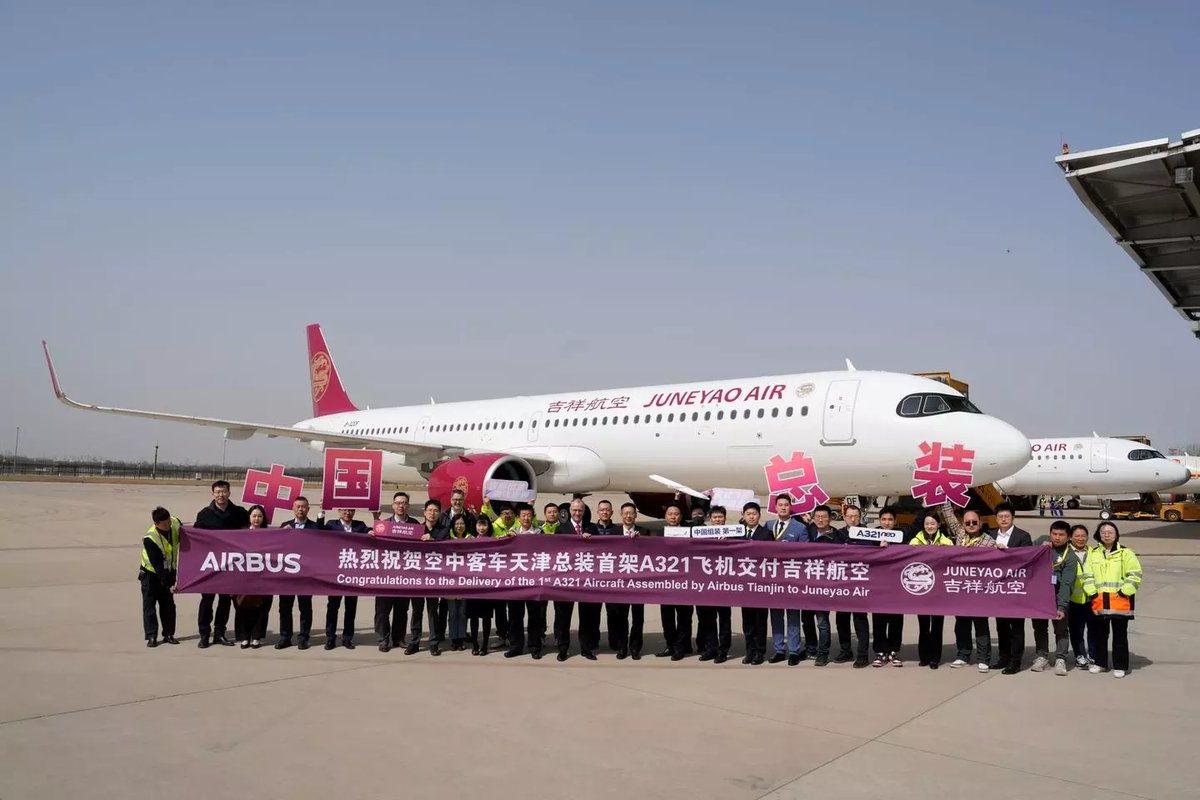Strategic Impact of the China Boeing Delivery Ban
The recent China Boeing Delivery Ban significantly escalates the ongoing U.S.-China trade war. Triggered by President Trump’s 145% tariff on Chinese imports, this move positions Boeing at a severe disadvantage, while Airbus stands ready to capitalize on this unexpected opportunity.
Why China Halted Boeing Deliveries
China’s suspension applies broadly, covering all Boeing aircraft, including those assembled at the Boeing-COMAC Zhoushan Completion and Delivery Centre. This facility primarily produces the Boeing 737 MAX for the Chinese market. China’s measures also include banning purchases of U.S.-made aircraft parts, potentially raising costs for maintaining existing Boeing aircraft operating in China.
Also read: Market Panic and US Tariffs: Can Canada’s Aerospace Industry Benefit? – Exploring how Canadian aerospace suppliers could leverage current trade tensions through strategic adaptation and innovation.
Strategically, Boeing symbolizes American industrial power. By targeting Boeing, China directly pressures U.S. economic interests to influence trade negotiations. I previously discussed Boeing’s geopolitical vulnerabilities on Fliegerfaust.com, highlighting broader risks companies face amid escalating trade disputes (Fliegerfaust).
Financial and Market Impact
Boeing immediately experienced adverse financial effects, with stock prices falling nearly 3% following China’s announcement. The China Boeing Delivery Ban immediately spurred adverse investor reactions. Investors quickly reacted to fears that Boeing might lose substantial long-term market share in China.
Conversely, Airbus saw its share price increase, highlighting investor optimism about Airbus’s potential to capture a larger portion of China’s growing aviation market. Analysts forecast substantial long-term financial risks for Boeing if China’s actions persist, estimating significant cash-flow losses.
Airbus: Strategically Positioned to Capitalize
Airbus maintains a strong manufacturing and assembly presence in China, providing significant strategic advantages. For example, the Airbus A220, originally developed as the Bombardier CSeries, is among the newest and most advanced commercial aircraft globally. Notably, Chinese manufacturers supply major airframe components, including fuselage sections for the A220, demonstrating Airbus’s deep integration into China’s aerospace industry.
The A220’s primary assembly line is located in Mirabel, Quebec, Canada, which performs initial pre-assembly work before final assembly. Components from China are first imported to Canada, a country currently facing its own economic tensions with China. From Canada, these assembled sections move onward to Airbus’s facility in Mobile, Alabama, for the U.S. market. This multinational production chain highlights potential complications from trade disputes, notably under agreements like the USMCA (United States-Mexico-Canada Agreement), which could influence tariff and customs policies on these components.
Also read: Canada to Cancel the Lockheed Martin F-35 order — Economic Risks & the Gripen Alternative for Canada
This local manufacturing strength positions Airbus favourably, allowing it to swiftly address increased demand from Chinese airlines that are now shifting away from Boeing.
Airbus’s strategic expansion in China significantly bolsters its global aerospace position, enabling it to rapidly respond to market opportunities created by Boeing’s recent difficulties. Airbus’s first major production facility outside Europe, the Final Assembly Line Asia (FALA) in Tianjin, began operations in 2008, assembling A320 family aircraft. The facility recently expanded its capability to include assembling the larger A321neo, delivering its first aircraft to Chinese carrier Juneyao Air in March 2023
Airbus Creating Jobs… In China
Recognizing China’s increasing importance to global aviation demand, Airbus began construction on a second assembly line in Tianjin in September 2023. This new facility aims to double Airbus’s local production capacity, aligning strategically with the company’s ambitious global production target of 75 aircraft per month by 2026, creating many jobs in China.
However, current trade tensions complicate matters. The Airbus A321neo primarily uses Pratt & Whitney GTF engines manufactured in the United States. China’s retaliatory tariffs, which impose up to 125% duties on U.S.-made aircraft and components, likely encompass these engines. This substantial cost increase could influence Chinese airlines’ procurement decisions despite Airbus’s robust local production capabilities.
Concerns Across the Airline Industry
Airlines worldwide closely watch these developments, with many concerned about potential disruptions. Ryanair specifically warned about possible delays in Boeing aircraft deliveries due to these tariffs. Increased operational costs and disruptions could significantly affect airlines dependent on Boeing, causing broader issues across global aviation supply chains.
Fliegerfaust.com has frequently highlighted how tariff conflicts directly influence airline operations, underscoring industry-wide sensitivity to trade disputes (Fliegerfaust).
Strategic Implications: Temporary Leverage or Permanent Realignment?
Experts are divided on whether China’s halt on Boeing deliveries is a short-term bargaining tactic or indicates a permanent shift in global aviation dynamics. While some anticipate quick diplomatic resolutions, others foresee a potential long-term realignment that might permanently advantage Airbus.
The aerospace industry must consider various scenarios and prepare for potential outcomes ranging from temporary disruptions to lasting changes in competitive dynamics.
Conclusion
The China Boeing Delivery Ban thus marks a potential turning point in global aviation dynamics. China’s halt of Boeing aircraft deliveries represents a strategic challenge for Boeing but an unprecedented opportunity for Airbus. Aerospace professionals in Canada, the U.S., and Europe should closely monitor developments, adjust their strategies, and remain agile. Decisions taken today will significantly influence global aviation’s competitive landscape.
Sources/References
- Barron’s
- Business Insider
- MarketWatch
- Fliegerfaust
- China Daily
- Global Times
- AviTrader
- Holland & Knight
For full details, please refer to our Disclaimer page.

